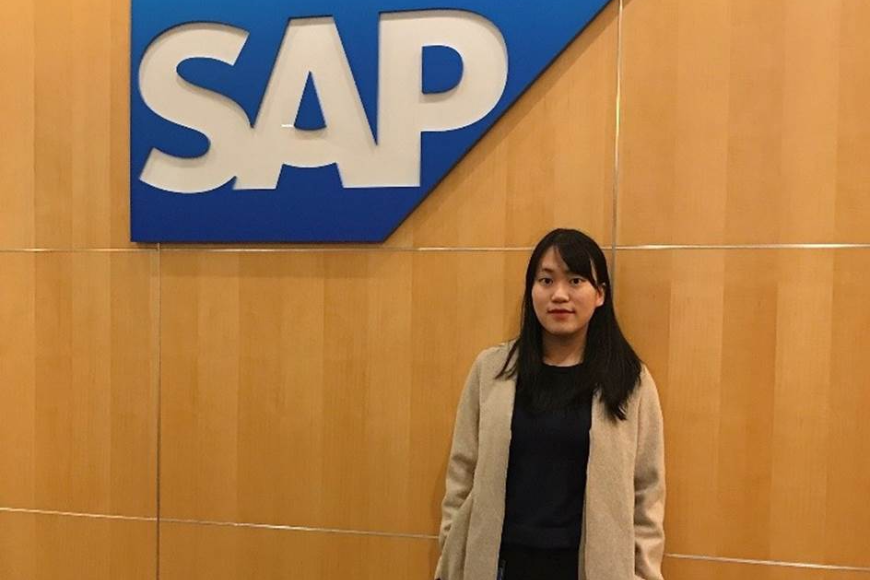
Like many others starting university, one of the first things I did was planning and listing out all the courses I needed to take each semester. My goal was to graduate within four years along with the completion of one or two co-ops. Little did I know that I am graduating with the completion of five co-op work terms in three different co-op positions.
Therefore, I wanted to put together this blog post to summarize my co-op journey, document my top five takeaways from these co-ops and express my final thoughts.
Co-op Work Term 1 and 2: Marketing Data Compliance and Management at SAP
I completed my first and second co-op work term as a Communications and Information Design Intern at SAP. My team was in charge of educating and training 2000+ SAP marketing stakeholders on the latest data privacy regulations for marketing-related activities. Some of my responsibilities in this role included:
- Restructuring and redesigning the internal team site with 15+ web pages.
- Migrating and organizing all the materials that were hosted on the previous site.
- Enhancing the consistency of the team’s communications material (e.g., developing a centralized style guide and multiple document templates).
- Leading the creation and publication of our team’s newsletter.
Not only was this my first co-op, but it was also my first exposure to working with a virtual team (i.e., all my team members worked remotely and were located in the Eastern United States). Although I was the only team member from Vancouver, my manager provided me with the opportunity to work in the office and experience the intern culture at SAP. Outside of work, I was involved in the Intern Committee as a Career Development Lead and joined the Bringing Women Together (BWT) as a Social Media Specialist.
With my background and native interest in Digital Marketing and Business Analytics, I completed my third co-op work term as a Marketing and Communications Coordinator at SFU to gain practical experience in social media marketing, email marketing, and digital marketing analytics. Here's a few of my responsibilities:
-
Planning and executing multiple social media campaigns for the SFU Alumni social media accounts (e.g., Fell in Love @SFU, Then vs. Now at SFU).
-
Creating content for the social media channels (e.g., take photos around the campus, and designing the Instagram stories).
-
Analyzing the data collected across social media accounts and developing recommendations for improvements.
-
Designing a variety of fundraising documents such as infographics, brochures, and guides.

With a combination of internal communications and external marketing experiences from the past three co-op work terms, I found my interest in user experience and website design. This led me to my fourth and fifth co-op work terms where I worked as a Digital Communications Assistant at the Digital Transformation Office at SFU. My role mainly assisted two of the high-profile IT projects at the university – Multi-factor Authentication and Microsoft 365 Project. Some of my main responsibilities include the following:
-
Designing, implementing, and maintaining 10+ web pages for the two projects.
-
Translating and simplifying technical documentations into user-friendly instructions and infographics
-
Developing compelling graphics, guides, and slide decks that support and maximize our adoption campaigns.

Looking back at these experiences, I have summarized my top 5 takeaways which I will always keep in my back pocket:
1. Expectation Management
Managing the expectations of your performance, a task assigned to you, or your input in a specific project is very important as it allows you to:
- Understand what’s expected of you and the things you need to do, so you can be more efficient and avoid the need to make assumptions.
- Engage in two-way communication with your team, so that both sides understand what’s expected of you and what’s expected of them. This can eliminate any potential misunderstandings and surprises.
The following are some of the tactics I used when managing expectations:
- Ask what success means in this role during the onboarding session.
- Schedule bi-weekly/monthly 1-on-1 meetings with your manager to ask for feedback and identify any areas of improvement.
- Ask the following questions when given a task by your manager/team members:
- Is there an approximate timeline/ delivery date for this task?
- Who do I go to when I have questions? Is there anyone I should consult with when putting together this task?
- Who needs to be involved in the review/approval stage of this task?
- Mention your next steps during status update meetings or meetings you run.
2. Prioritization
Oftentimes, you will be working on multiple tasks at the same time, and some of the tasks might even have conflicting deadlines. What I found useful is to document the tasks using a spreadsheet with the following headings:
| Headings | Content |
| Week # | The week number and the date |
| Priority | Low / Medium / High / Urgent |
| Deliverable | A brief description of your deliverable |
| Assigned Date | The date when the deliverable was assigned |
| Due Date | The due date or approximate deadline |
| Status | Not Yet Started / Waiting for Review / Completed / Pending Notes/Comments/ |
| Resources | Any notes, comments, resources, and/or links to the finished documents. |
With this deliverable tracking spreadsheet, I was able to stay organized with the tasks on hand and easily prioritize to meet any deadlines. Also, I found it helpful to share this spreadsheet with my managers to maximize the transparency of my work.
3. Get Comfortable Working With Ambiguity and Uncertainty
Tasks and/or projects are often given with minimal instructions, so it is important to get comfortable with ambiguity and uncertainty. In these situations, my usual approach is to take the information provided and brainstorm for possible solutions. Then, I will schedule a meeting with my team members or whoever assigned the task to confirm that I am on the right track. This method ensures that I am not spending my time and effort in the wrong area.
4. Take Initiative and Volunteer
I found it helpful to take initiative and volunteer for tasks and/or projects that come up during meetings, even if they are not within my work area. For example, I often volunteer to take the meeting minutes during my team meetings, so that I can stay engaged and get a better understanding of the items discussed. Another example is the time when I volunteered for a User Acceptance Testing (UAT) to learn more about how the team conducted UAT and collected feedback.
5. Get Involved Outside of Your Day-to-Day Work
If you have the opportunity to do so, make sure to get involved outside your day-to-day work (e.g., join the after-work activities, or even organize one yourself!). As mentioned in my co-op journey, I got involved in the Intern Committee as a Career Development Lead and joined the Bringing Women Together (BWT) as a Social Media Specialist. By doing so, I was able to meet and network with amazing people that were outside of my team, as well as understand the company culture.
Final Thoughts
I am truly glad that I took time out of my undergraduate journey to do co-op. I was able to apply the concepts I learned in class, learn about things that weren’t taught in class, work on my soft skills, and meet people from different fields. In addition, these experiences allowed me to understand what I want to do as a career, as well as what I don’t want to do as a career.
I strongly recommend to everyone to do at least one co-op work term in their undergrad, because it truly makes a difference. Thank you for reading my co-op journey and my top five takeaways, I hope you will find these helpful in your own co-op journey.














